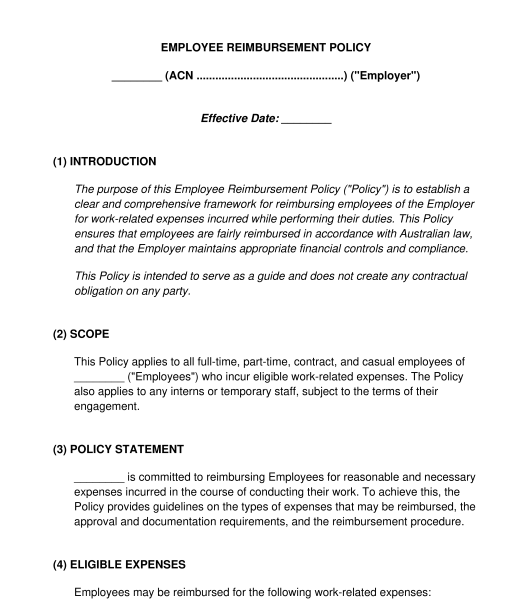 07/11/2025
07/11/2025

Answer a few questions and your document is created automatically.

Your document is ready! You will receive it in Word and PDF formats. You will be able to modify it.

 07/11/2025
07/11/2025
 Word and PDF
Word and PDF
 4 to 6 pages
4 to 6 pages
An Employee Reimbursement Policy is a document established by the employer that sets forth the rules, practices, and procedures for reimbursing employees for expenses incurred during the course of their work.
In an Employee Reimbursement Policy, the employer informs employees about the types of expenses that can be reimbursed, the documentation required, and the procedure for claiming reimbursement. This may cover various expense categories such as travel, meals, office supplies, training, and professional memberships, amongst others.
In Australia, it is not mandatory to have a written Employee Reimbursement Policy. However, employers need to comply with the Fair Work Act 2009 (Commonwealth) as well as any applicable modern awards or enterprise agreements, which create various obligations for employers regarding reimbursement of employee expenses. Therefore, using a written Employee Reimbursement Policy can help employers to comply with these obligations, can help standardise their handling of expense claims, and can help employees to understand the employer's approach to these matters.
In addition to an Employee Reimbursement Policy, there are various other employment policies that employers should consider, such as:
Usually senior members of staff will prepare the Employee Reimbursement Policy. This could involve senior managers or directors, payroll officer, or a human resources officer.
There is no expiry date for an Employee Reimbursement Policy so it can remain in place indefinitely. However, it should be reviewed regularly to ensure that it is up to date with current laws and with the organisation's current practices.
Once an Employee Reimbursement Policy is ready, it should be printed and/or saved electronically and kept on file with the employer, and employees should be made aware of it. For example, any existing employees should be notified of it and given a copy of it. Many employers use a Letter to Employees about New or Updated Workplace Policies to do this. In addition, each time a new employee starts work with the employer, the new employee should be given a copy of the policy.
It is also a good idea to keep the policy in a place where it is easy for employees to refer to it - for example, physical copies could be kept in communal areas such as staff rooms. It could also be made available online, for example on the employer's shared drive.
If the employer is getting employees to sign this policy, the employer should get each employee to return a signed signature page, and should keep those signed pages on file.
From time to time, if the employer implements new rules or procedures, it may be necessary to update the policy. When this occurs, the employer may notify employees of the updates, and release a new version of the policy. The employer may ask employees to sign a new signature page at that time, to acknowledge the updated policy.
An Employee Reimbursement Policy should contain adequate information to allow employees to understand the employer's approach to reimbursement of expenses. The can include information about:
Employee Reimbursement Policies may be affected by various Australian laws.
For example, tax implications of certain reimbursements may be affected by the Australian Taxation Office guidelines and Income Tax Assessment Act 1997 (Commonwealth).
Additionally, the Fair Work Act 2009 (Commonwealth) provides general protections for employees, which could be relevant in the event of disputes arising from the reimbursement process.
Ordinary principles of contract law, as provided by the common law, may also apply to the general terms of the employee's employment. If in doubt, seek legal advice.
You fill out a form. The document is created before your eyes as you respond to the questions.
At the end, you receive it in Word and PDF formats. You can modify it and reuse it.
Employee Reimbursement Policy - sample template
Country: Australia